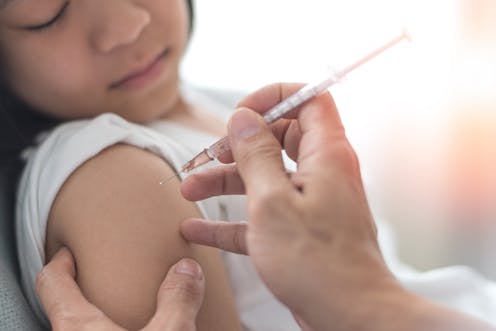New Gardasil 9 vaccine boosts teens' protection from HPV and cervical cancer by 23%
- Written by Suzanne Marie Garland, Professor, Melbourne University, The Royal Women's Hospital

As 12 and 13-year-old boys and girls start a new school year, they will have access to the new, improved vaccine to protect against the human papillomavirus (HPV), which causes cervical cancer in women.
While the previous Gardasil vaccine protected against 70% of cervical cancers, the updated Gardasil 9 version will protect against up to 93% of these. And compared to the three doses required with the previous regimen, only two are needed now.
In Australia, around 900 new cases are diagnosed and around 250 women die from the disease each year. But cervical cancer rates have halved in the past 30 years due to the high quality national Pap cytology screening program.
Prevention against cervical cancer is the main aim of the Gardasil 9 vaccine. But HPV is also linked to a large proportion of anal, vaginal and head and neck cancers, and the vaccine offers protection for these too.
Read more: Interactive body map: what really gives you cancer?
What is HPV?
Genital HPV is a common group of viruses, mainly transmitted through sexual contact, including contact of genital skin to genital skin. Most people are infected with HPV shortly after the onset of sexual activity and most clear the infection on their own.
But for a small number of those infected, the HPV becomes persistent. A proportion of these people will go on to develop abnormal cells that are the precursor to cervical cancer. HPV is the cause of nearly all cervical cancers. But the virus is also linked to 90% of anal cancers, 65% of vaginal cancers, 50% of vulva cancers and 35% of penile cancers and 60% of oropharyngeal cancers (cancers of the back of the throat, including the base of the tongue and tonsils).
The Australian government was one of the first to introduce a free Gardasil vaccine to all female students aged 12 to 13 years in 2007 (with a catch up to the end of 2009 for those up to 26 years of age). This protected against four different strains of HPV. Two of those strains (HPV 16 and 18) cause about 70% of cervical cancers; the other two cause the majority of genital warts (HPV 6 and 11).
Read more: New study shows HPV vaccine is working to reduce rates of genital warts
Australia was also one of the first countries to adopt a school-based, gender-neutral vaccine program in 2013, by introducing free, ongoing vaccinations to young boys 12 to 13 years of age.
What does Gardasil 9 offer?
The new Gardasil 9 vaccine, available from this week, targets nine strains, seven of which cause around 93% of all cervical cancers (in addition to HPV 6/11 so protects against 90% of genital warts). It includes protection for the five next most common cancer-causing HPVs globally (HPV 31/33/45/52/58).
The new vaccine has been tested in global clinical trials involving more than 14,000 women in 18 countries, aged 16 to 26 years. They received either the new Gardasil 9 vaccine or the original Gardasil vaccine. Published in the New England Journal of Medicine and the Lancet, the study looked at the rate of pre-cancerous cell changes in women six years later.
It found the new vaccine was far more effective, targeting an extra five of the most common cancer-causing strains of HPV and potentially preventing 23% more cervical cancers. Thus infection with the new types was markedly reduced too. With a reduction in infection, there is a reduction in the diseases that the HPV can cause.
Read more: Weekly Dose: Gardasil 9, the vaccine that could soon protect against cervical cancer in fewer doses
The common side effects with Gardasil 9 in the clinical trial were the same as with the older Gardasil vaccine. These were pain at the injection site, local swelling in the arm at the injection site and redness. There were no differences between the serious adverse events between the two vaccines.
Who should get the new vaccine?
Australia was one of the first countries to adopt an HPV vaccination program and has one of the highest coverage rates, with around 79% of girls and 73% of boys having received the Gardasil vaccine.
Those who have already had the original vaccine have excellent protection from HPV, so we are not recommending they should go back for the new vaccine.
The new vaccine is free to 12- to 13-year-olds as part of the National Immunisation Program. It’s also available at a cost to adults and has been shown effective in protecting against HPV in people up to the age of 45 years.
Those who have not been infected by the strains of HPV gain the most benefit from the vaccine. However, the vaccine boosts the immune response in sexually active individuals who have been infected previously with any of these HPV strains targeted by the vaccine, should they come into contact with the virus again.
Regular screening important
It’s important women continue to have regular screening to avoid abnormal cells developing into cervical cancer, even if they have had the vaccine. In December 2017, Australia’s screening program changed. The Pap test was replaced by a cervical swab testing for HPV DNA. This is a more sensitive test to detect underlying cellular abnormalities than the Pap test.
A five year study involving 5,000 women found the new HPV test was far more effective in detecting high grade pre-cancerous changes to the cervix compared to the traditional Pap test. It has the potential to prevent 30% more cervical cancers.
Women will now have their first test at age 25 instead of 18. After their first HPV test, women will be tested every five years instead of every two years. They will be tested up to age 74, and, in an important development, self-collection will be an option for some women who may have difficulty with a vaginal test.
We are already seeing the benefit of the original Gardasil vaccine on rates of HPV. With high coverage of the new Gardasil 9 vaccine, and adoption of the new HPV screening test it is predicted we will see a rapid decline in the cervical cancer rate in Australia in the coming years.
Read more: Never had a Pap smear? Now there's a DIY option for you
Authors: Suzanne Marie Garland, Professor, Melbourne University, The Royal Women's Hospital



















